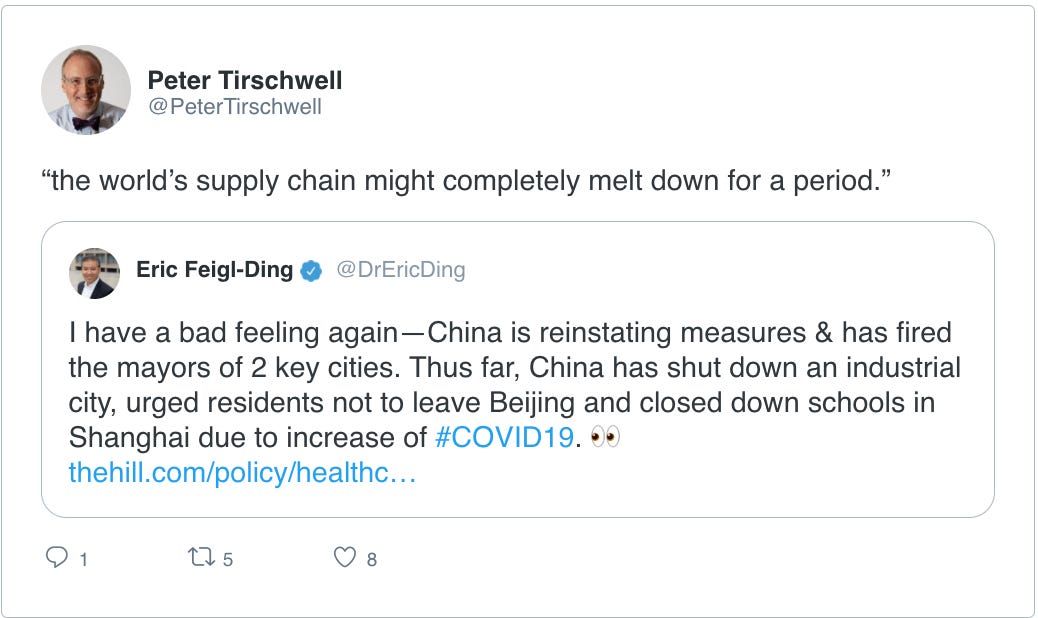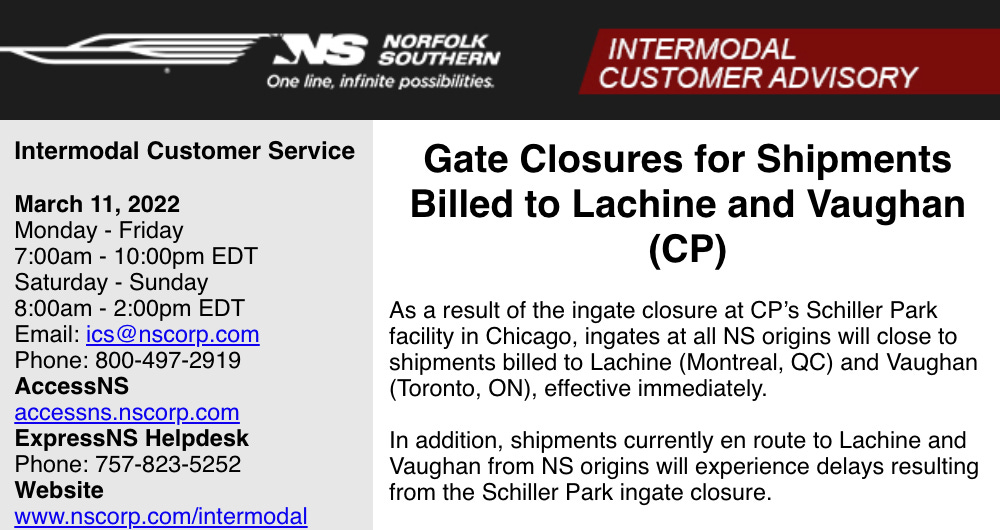Welcome to Please Haul My Freight: Edition 17. Here are some of the items in my TPM 2022 notebook:
NOT AGAIN: Another COVID-19 outbreak has hit in China. Among the impacts on ocean shipping, according to SEKO Logistics:
The Yantian Free Trade Zone will be closed from 14-20th March
No cargo will be able to load in Yantian this week and vessels most likely will omit the port.
From Lars Jensen of Vespucci Maritime on LinkedIn:
“It should be kept in mind that when Yantian was shut down due to Covid last year, the disruptive impact on cargo flows was roughly twice the size of the blockage of the Suez Canal.”
XPO INTERMODAL: If you read this notebook, then you knew about XPO’s desire to sell off domestic intermodal in November 2021. Now that it’s official, the question becomes: who will buy XPO Intermodal?
I can’t stress enough rumors are not news, rumors are not reportable, and rumors are not facts.
Maersk expressed an interest in XPO intermodal last November. However, a source told me Maersk is out of the running— even though Maersk keeps coming up. CMA CGM and Mediterranean Shipping Company are other international names.
Possible US names: Amazon, Hub Group, Ryder Supply Chain Solutions, Walmart.
I’m also hearing XPO intermodal might sell to private equity. Perhaps York Capital Management (owns Mode Transportation), or The Jordan Co. (owns logistics firms AIT, Capstone, Echo Global, and Odyssey), or the Carlyle Group.
Sources tell me XPO may package domestic intermodal and port drayage together.
Out of all these possibilities, I think it’s Amazon, Maersk, or a PE firm like Carlyle Group.
FUEL SURCHARGES TRUCK: The fuel surcharge for trucking is growing fast. It was $0.48 cents nationally on March 6, but it jumped to ~$0.58 in one week, using DAT’s methodology. That surpasses March 2012 for the highest ever.
If we do a fuel breakthrough calculation, shippers could be charged $0.75-$0.85 per mile. Shippers are on the hook for a seven-figure hit to their transportation budgets.
FUEL SURCHARGES RAIL: Let’s examine Los Angeles to Chicago to compare fuel surcharges by mode. The distance: 2,025 miles.
RAIL:
Rail: $1,726 x 0.475 (FSC only) = $820.
LA and Chicago drayage (FSC only)= $230
Intermodal Fuel Total: $1,050
TRUCKLOAD: ~ 300 gallons depending on whether the truck is 6 mpg or 7 mpg
Breakthrough fuel: 300 x $5.393 (California diesel rates) = $1,617.90
DAT methodology: ($5.393-$1.25)/6 = $0.6905 per mile X 2,025 = $1,398.26
Large carrier data: $0.84 per mile X 2,025 = $1,701.00.
Rail wins, but a few items to point out. In this hypothetical, the railroad earns $820 per container on a train holding up to 300 containers. Unless I’m missing something, the railroad is grossing $125,000 to $250,000 per train in fuel surcharges.
Second, consider on-time performance. One large IMC has an on-time performance on pickups and deliveries of 66.6%, and that IMC is not the only below par.
3PL REPORT: The Transportation Intermediaries Association released its 4Q report last week, and there were interesting numbers on intermodal. Rail volume among surveyed 3PLs declined 10%, however the invoice amount per load rose 22.4% YoY. In general, margins have hovered between 8% and 12% since 2020, according to TIA.
TRANSLOADS: I wonder how fuel surcharges will impact transloading. Transloading has become popular because ocean carriers have been reluctant to let their containers go inland via intermodal rail (IPI).
To begin March, the JOC Shipper Truckload Spot Rate Index1 showed transloading vs. IPI prices were identical from Norfolk to Chicago. But with a HUGE increase in fuel surcharges hitting shippers (see above), this equation may quickly change.
Do you think the fuel surcharges tip the scales on transload vs. IPI? Let me know.
CHASSIS: There are more chassis supply shortages: domestic and marine chassis. Hearing complaints about Chicago, Cincinnati, Columbus, and Detroit, and Dallas.
Jason Hilsenbeck tells me:
“Dallas is by far the worst right now. Even worse than Chicago.”
On the domestic side, this from an IMC source about Dallas-Ft. Worth:
“BNSF Alliance has been ground stacking for four- to five- weeks. We're seeing ground stacking in KCS Wiley. And we hear it may happen in UP Mesquite, but we haven't seen that yet. The chassis shortage in Dallas is pretty massive right now.”
And this from a trucking executive in Dallas:
“All the ramps in Dallas are days behind right now. Hundreds of chassis short at KCS Wylie. UP is 1.5 days behind on notifications. BNSF won't tell us, but they are WAY short too on 53's.”
DCLI CEO Bill Shea said that domestic chassis pools would remain constrained through the second quarter. DCLI is ordering 40,000 domestic chassis to be delivered in the next 12 to 18 months, Shea revealed at TPM22.
Street turns are also really wreaking havoc. Chassis pools were not built to withstand some of the street dwells on these chassis. Another factor is parcel, LTL, and temp-controlled companies replacing trailers on flatcar (TOFC) with containers.
Larry Gross has a good column on this angle.
PORT VOLUMES: For the 20th consecutive month, laden imports topped 2 million TEU. For the last 12 months, it has topped 2.25 million TEU. No wonder ports are struggling with the volume. Look at this graph:
EXPORTS: The Agriculture Transportation Coalition released its 2021 Exporter Service Impact Survey on March 14. Among the key findings:
The value of the lost sales by individual company during 2021 range from $120,000 for the smallest exporter up to $65,000,000.
85% of respondents who stated they lost export sales attributed the lost sales to inability to deliver within the contracted time period.
Ag exporters were able to deliver timely to overseas customers 35% of the time
CHARLESTON: Norfolk Southern has put tight caps on exports to Charleston:
The Port of Charleston is opening gates early for truckers hauling containers to the NS ramp. It has also embargoed exports in the morning several times.
The idea is to take imports into NS in the morning, flip the chassis, and take exports back to the Wando Welch Terminal in the afternoon. NS has gone grounded in Charleston (normally a “wheeled” terminal) to facilitate chassis flips.
NS wants to further incentivize the flow, offering participants who operate at a 75% dual mission percentage in Charleston a cash credit of $135 for each outgated container in a dual move.
CP STRIKE: Norfolk Southern issued this alert as negotiations between Canadian Pacific and the Teamsters reach the 11th hour before a March 16 strike:
MEXICO-US: Mark Szakonyi interviewed Canadian Pacific CEO Keith Creel at TPM22. Mark noted how getting 53-foot EMP containers into Mexico is often very difficult, asking Creel: How CP-KCS will address this post merger?
Creel’s answer:
“It's about the strategic partnerships. Again, back to what I mentioned just a moment ago, asset-heavy transportation companies: JB Hunt, Schneider's, Hub Group. They have the skill, they have the assets. If they're not sending empties [into Mexico] when they have an alternative, especially in a high demand world, they care about cycle turns, right? They want their assets to turn. So if you can create a load-load situation, they're going to be able to deploy those assets and create a unique network where it's single line.”
My interpretation: CP wants asset-based IMCs to use new Mexico-US Midwest domestic intermodal services. If they generate interest with J.B. Hunt, Schneider, and Hub Group, then eventually non-asset IMCs will get new rail-owned containers.
STRANDED VESSEL: The Ever Forward got stuck in the Chesapeake late Sunday after leaving the Port of Baltimore while in route to the Port of Virginia. Its position near Gibson Island should not impact operations. There’s enough room for vessels to get around the Evergreen vessel. This is not the Ever Given in the Suez. Not even close.
C.H. ROBINSON: If activist investors push C.H. Robinson CEO Bob Biesterfeld out, one possible replacement is former CFO Andy Clarke.
Ancora Catalyst Institutional, one of the activist investors, put Clarke on Forward Air’s board last year.
More from Jack Atkins at Stephens Inc:
It does not surprise us that an activist is getting involved here. What does make us scratch our heads is how quickly C.H. Robinson handed over control of 27% of its board to an activist that owns/controls just ~3.3% of the company’s stock.
This begs two key questions.
First, was the board already frustrated with the direction of the Company and thus open to the idea of bringing in outsiders (specifically a 40 year veteran operator from FedEx Ground) to take a fresh look at the business and strategy?
Second, was CHRW concerned that former CFO Andy Clarke, who is aligned with the activist shareholder group, had credible disagreements over strategic decisions that have been made over the past 5 years that might be aired [out]?
Any opinions in this notebook represent the author’s views, not the Journal of Commerce, IHS Markit, S&P Global, or my wife. Any rumors in this notebook are just that: rumors. Unconfirmed. Not news stories.
Do you have an opinion on anything I wrote or a subject you’d like me to cover?
Email me ari.ashe@ihsmarkit.com to send your thoughts. You may also request our data behind JOC’s Intermodal Savings Index and JOC’s Shipper Truckload Spot Rate Index, available to paid JOC subscribers.
Don’t have a JOC.com account? You can change that!
JOC’s Shipper Truckload Spot Rate Index, which is available to paid JOC subscribers upon request, is an analysis of truckload data supplied by Cargo Chief, DAT Solutions, digital broker Loadsmart, and a JOC.com survey of shippers and 3PLs.









